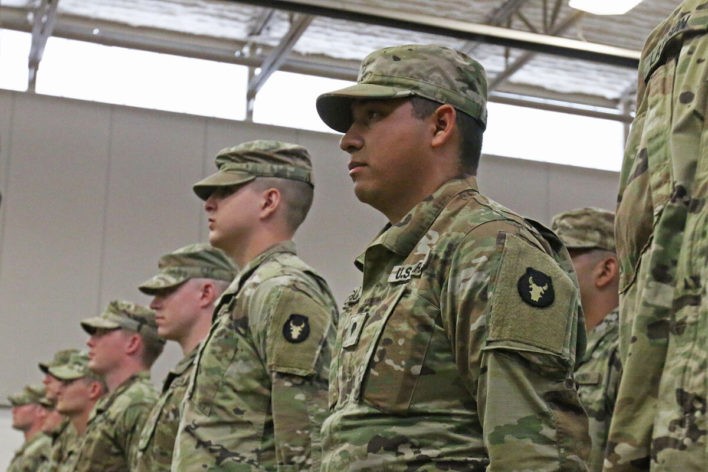Protect Yourself from These Common Military Scams

How Military and Veterans Can Protect Themselves From Scams
These days it can feel like you can’t trust anyone. Scams are everywhere, between people impersonating a business you actually trust to others getting ahold of sensitive information to steal your identity. It can be a bit confusing and frustrating as you try to protect yourself.
There are scammers out there that focus on veterans, service members, and military spouses. There are also things you can do to help protect yourself. Here are a couple of military scams aimed at active duty military and veterans to be aware of. Also, we discuss how to protect yourself.
According to a recent AARP study, nearly 80% of veterans reported being targeted by scams related to their service. Arm yourself with knowledge. Here’s a list of common military-targeted scams:
VA Home Loan Scams
The Consumer Financial Protection Bureau issued an alert recently about a VA home loan scam. Members of the military, veterans, and military spouses have been receiving fraudulent phone calls and mail from companies that are claiming to be affiliated with the VA, the government, or even home loan servicers.
The scammers will try to get people to refinance their homes, agree to loan modifications, or even pay their loans using purchased money orders. They also make people think that they are facing foreclosure on their homes.
RELATED: VA Loan Limits 2022
Advance-Fee Scams
Scammers glean factual data from official websites and then pretend to be fellow soldiers who need help moving large sums of money. The scammer will offer to pay you a commission if you’ll temporarily transfer their money into your bank. If you agree to do this, they’ll then convince you to lend them the funds transfer fee up front. Once you send them that fee, they vanish.
Benefits Scams
If you get an unsolicited call, text, or email offering to help you increase your benefits, get your benefit money in a lump sum, or access little-known government programs, beware. It’s probably fake.
COVID-19 Scams
These scammers send out unsolicited emails offering alerts or information related to COVID-19. By clicking on links in these emails, you might download malware or have your identity stolen. There are also scammers who are using COVID-19 to trick service members and their families into revealing sensitive information and/or donating money.
Credit Monitoring Scams
Beware of companies that offer to monitor your credit while you’re deployed. Scammers sent out official-looking solicitations for these services, sign you up, and then use that credit information to go on a spending spree.
If you’re on active duty, it’s wise to put an “Active Duty Alert” on your credit report. Taking that precaution is free and easy:
1.) Contact one credit bureau. Request an Active Duty Alert. The credit bureau you contact will notify the others.
2.) Mark your calendar. An active duty alert lasts for one year. If your deployment lasts longer, renew the alert.
Debt Collection Scams
These official-sounding scammers contact military personnel and try to pressure them into paying debts they don’t have.
Deployment Deception Scams
Scammers create fake ads pretending to be a service member who is being deployed and therefore needs to quickly sell a car or other expensive item. They’ll set a low price, insist on up-front payment, then take the money and run.
RELATED: Financial Planning for Your Next Deployment
Email Bombing
Emailing bombing is a tactic scammers can use to mask what they are actually doing. With emailing bombing, the scammer will sign your email up to thousands of different newsletters and websites using a bot. They do this to mask emails coming to your account that could be for purchases they have made using your information or financial accounts they have opened up in your name.
The hope is that you are too busy dealing with all the extra emails, they can slip by without your notice. You have to be on top of your email to make sure nothing like that comes through.
Employment Scams
These are fake ads recruiting veterans for “previously undisclosed” federal government posts, work for unspecified military contractors, or other positions in which prior military service would be a plus. Completing their “application process” sometimes involves downloading malware that can give hackers access to your computer. Other times, they’ll steal your identity outright by asking for personal information for a supposed background check.
Fake Military Members
Some scammers pretend to be members of the military. They steal photos from real members of the military and become romantically involved with unsuspecting people. They then will ask for money saying they need it in order to get home from a deployment, or for food or other necessities. All expenses that are usually paid for by the military.
Fraudulent Records Offer Scams
These scammers charge a fee to help you access military records and/or government forms that are readily available for free.
“Grandparent” Scams
Scammers study local news articles to learn about the relatives of those deployed. They then reach out to those relatives pretending to be the deployed person, and claiming they’re in an emergency that requires quick cash. Make sure your older relatives are aware of this type of fraud.
Jury Duty Scams
If you get a call from someone claiming they work with the court system back home, and telling you there’s a warrant out for your arrest because you didn’t show up for jury duty, beware. If they ask for your credit card or social security number, tell them you’ll contact the court yourself.
“Keep Your Military File Up-to-Date” Scams
Scammers pretend to be from the Department of Veterans Affairs. They’ll ask questions to “update” your file. What they’re really after is information they can use to steal your credit.
Life Insurance Scams
Dishonest insurance agents are known for targeting military members and pressuring them into buying over-priced and unnecessary life insurance coverage.
Military Loan Scams
Beware of “Military” car and personal loans that require no credit check and have instant approval. They often come with up-front fees and repayment terms that can leave you with staggering debt.
Non-Existent Charity Scams
Some scammers make up fake military-related charities, others steal the identities of reputable ones. Before you give your hard-earned money to any cause, it’s a good idea to look them up here.
“Old Friend” Scams
Be suspicious of calls or emails from anyone claiming to be an “old friend” needing help in an emergency or offering you a surefire investment opportunity.
Phishing Scams
Phishing scams seem to be everywhere these days. Unfortunately, sometimes they use military-related companies and organizations that you trust to get information out of you. You might get an email or phone call from someone claiming to be from DFAS (Defense Finance and Accounting Service) asking for your personal information or with links to click that can put malware on your computer that steals your personal information.
Rental Property Scams
These scams target military personnel looking for housing near a base. Scammers pretend to be real estate agents and post fake ads for rental properties, often promising military discounts. They ask for money upfront and then disappear, leaving you with no money and nowhere to live.
Sextortion Scams
Service members are often targeted by scammers who seduce them into sexual activities online that are secretly recorded and used to blackmail them later.
“Soulmate” Scams
Every year scammers create thousands of fake profiles either posing as deployed military members, or targeting the hearts and pocketbooks of actual military personnel. Once the long distance romance is underway, they’ll ask for money under the guise of a paycheck snafu, a medical emergency, or plane ticket to come and meet you.
Social Media Scams (Card Popping)
Scammers make fake accounts on Facebook, Instagram, and Twitter. They impersonate military personnel, friend troops, draw them into relationships through direct messaging, and eventually start asking for money.
Toll-Free Scams
There’s an impostor toll-free phone number that mimics that of the Veterans Choice Program (VCP), which allows certain vets to use approved health care providers outside of the Department of Veterans Affairs (VA) system. Those numbers have identical seven digits (but a different area code) to the toll-free numbers belonging to trusted entities. When you call back, (dialing 800 instead of 866 or 877, for example), you’ll find yourself in a conversation with a scammer.
VA Impersonator Scams
Hang up if you get an unsolicited call or text from the VA. Know that the VA will never ask for personal data by phone, text, or email.
Do your homework and follow your hunches. If a deal seems too good—or too urgent—to be legit, it probably is.
RELATED:
- 3 Basics of Budgeting for Military Families
- Financial Steps to Take Early In Your Military Career
- Best Budget Apps for the Military
- Best Practices for the VA Loan Process
- All-Too-Common Money Mistakes of the Military Family
- Ways to Improve Your Credit Score
About the author
Julie Provost is a freelance writer, and blogger. She lives in Tennessee with her National Guard husband and three boys.



